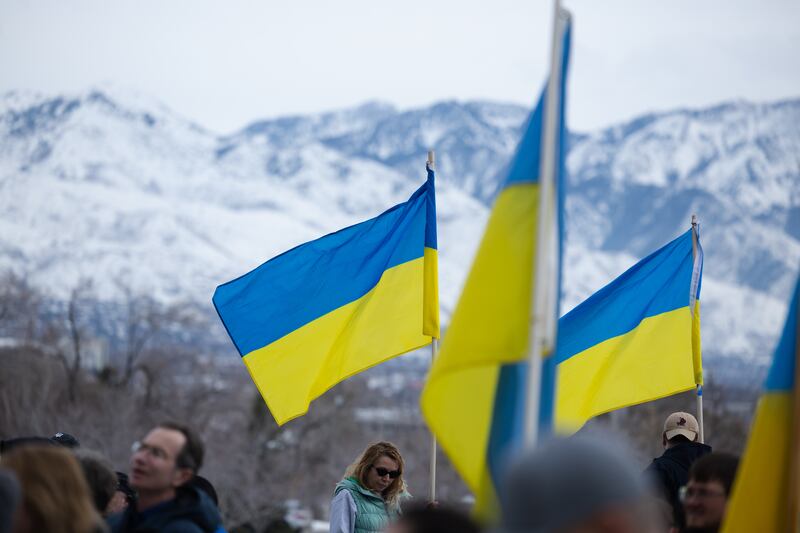Two years ago, I was in Southern California when I got the news that Russia had launched a full-scale invasion of Ukraine. It was my daughter’s 5th birthday and on the docket were a visit to the zoo, cake with cousins and a long-awaited trip to Disneyland the next day. While physically I was with my children, my mind was at home in Kyiv, Ukraine — with my parents.
There, the panic had begun within hours of Vladimir Putin’s announcement of a “special military operation.” People were scrambling to find transportation to evacuate, highways westward jammed with traffic. Horror stories spread quickly and nobody knew what would happen next. I wrote about evacuating my family from Ukraine for Deseret in March of 2022.
The past two years became a process of learning how to live with grief and uncertainty, and how to inhabit two realities at once: one of my life stateside — safe, quiet, predictable — and one in which missiles and shrapnel are destroying homes every day, killing soldiers and children, while the end of the war in my homeland seems to grow increasingly distant.
More than 10,000 Ukrainian civilians have died in the war, according to the Office of the United Nations High Commissioner for Human Rights, and about 70,000 soldiers have been killed, according to U.S. officials. Since February of 2022, more than 6 million people have left the country and nearly 3.67 million are internally displaced. And it’s estimated that 83,000 Russian soldiers died in the war, according to new data from two independent Russian media outlets.
Today, two years since the invasion and 10 years since the annexation of Crimea in 2014, the war has stalled due to the shortage of artillery ammunition, with Ukraine recently losing Avdiivka last week, an industrial city in the Donetsk region.
And while the path forward as the war drags on is uncertain, Ukrainians themselves have never been more sure of who they are.
Despite the recent disappointments on the battlefield, the unity and sense of national identity that were forged at the expense of tragedy and lives have not waned. A recent study from the Ministry of Culture asked 3,200 Ukrainians from several regions to rank their Ukrainian consciousness — how Ukrainian they felt — regardless of where they were born (most identified as Ukrainian citizens). The study found in two years of the war people self-identify more strongly as Ukrainians, and cited deepened interest in the country’s history and culture. The common cultural heritage fueled the emotional resolve to resist the occupants, the study said.
I, too, have grown closer to my Ukrainian culture and language since the invasion by reading poetry, learning new vocabulary and discovering Ukrainian music. In the face of the looming threat of losing my native culture, clinging to it feels urgent and necessary.
This week, as the world marked the second anniversary of the invasion, Ukrainians on Feb. 21 celebrated International Mother Language Day, a UNESCO holiday that found particular resonance with Ukrainians this year. In honor of the occasion, I had a chance to speak about my efforts to return to my native Ukrainian language with students at Odesa National University in a virtual event — which had to be rescheduled due to a prolonged air raid.
Growing up in the 1990s in Kyiv, I spoke Russian at home with my family, even though Ukrainian was the dominant language at my school and in more formal settings. Making an intentional effort to speak Ukrainian has felt like tapping into the part of my Ukrainian identity that’s often been overshadowed by my American one, since I have lived in the U.S. for over 20 years. As I listened to the Ukrainian language and literature professors from Odesa National University, I was struck by their earnest commitment to the language that, unlike me, they use and teach every day. For them too, Ukrainian was no longer just a language of communication, but a way of fighting this war.
One professor spoke about the disagreements in 1917 over whether Russian or Ukrainian should be the language of Orthodox church services and how language separatism led to a religious one. Literature expert Tetyana Shevchenko spoke about drawing strength in times of despair from the poetry of Taras Shevchenko (no relation), a national bard of Ukraine who spent half of his life in serfdom under the Russian empire. She read a few lines from his poem about casting out an adversary from the Ukrainian land.
“I trust his words, and I know this is exactly how it’s going to be,” she said. “Sometimes, when I feel lost, I start reading Shevchenko; his words help me believe in the freedom that I know will come.”
Philologist Larysa Shevchuk invited the students to raise their future children speaking Ukrainian. “We’re in the existential battle for the survival of our nation and our language,” she said. The idea that language is the symbol of Ukrainian defiance and the means all Ukrainians can employ to fight the war resonated with me.
The celebration of my daughter’s birthday — she turned 7 this year— and the day of the full-scale invasion will always remain mutual reminders of one another, and polar opposites in the feelings they stir up. My daughter’s brightness helps me sustain hope that a peaceful future will come to Ukraine. But I also know the costs we will pay to get there.


